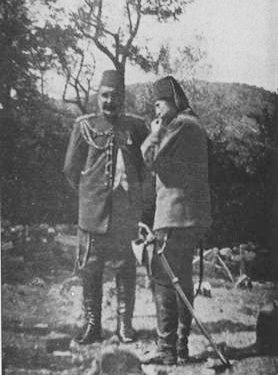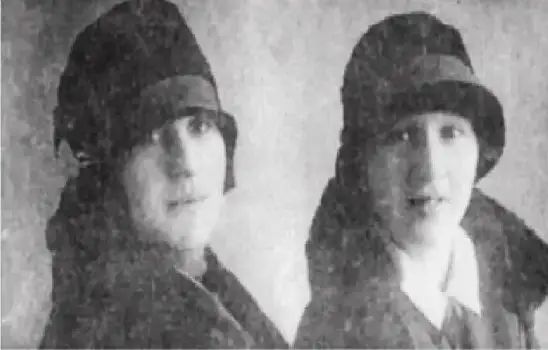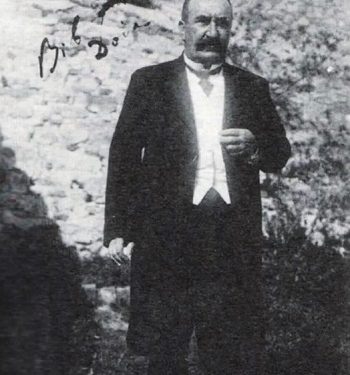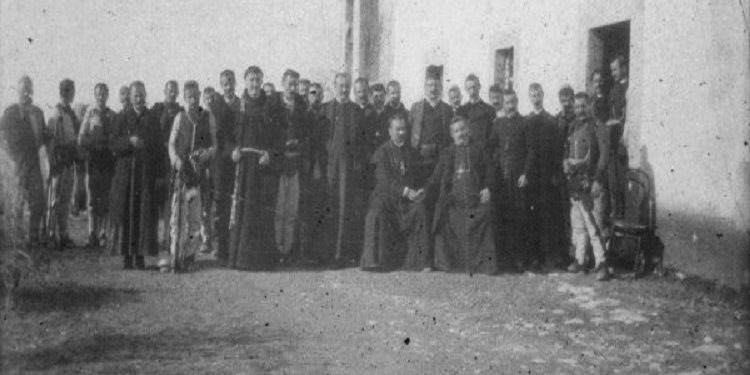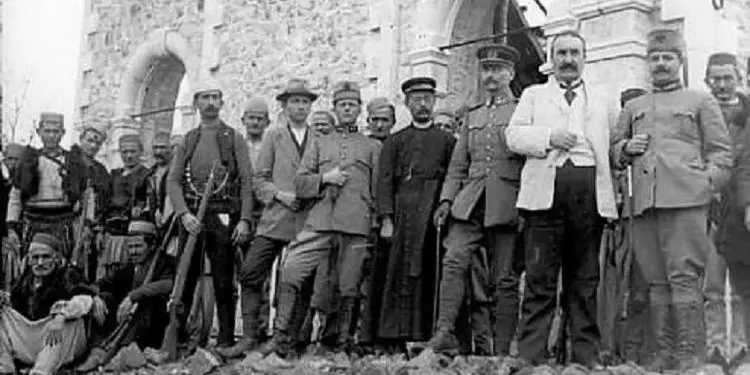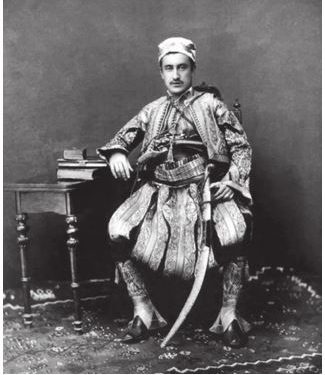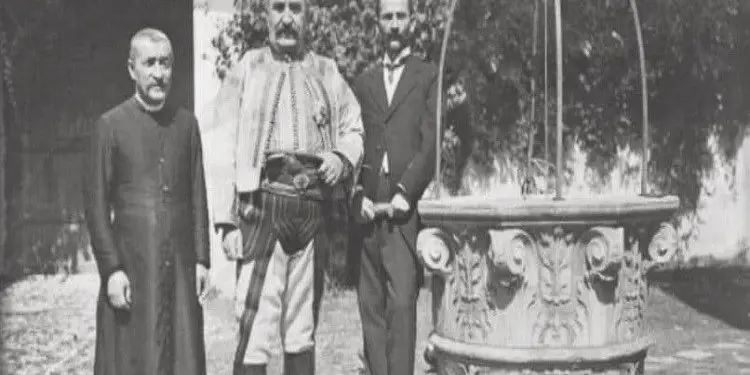By Dr. Nikol Loka
Part Eighteen
“PRENGA BIBE DODA, THE SHADOWS OF A CITIZENSHIP”
Memorie.al / The newest book “Prengë Bibë Doda, a phenomenon in Albanian political life”, by researcher Nikollë Loka, not only expands the scope of historical studies on Mirdita, the Door of Gjonmarkaj and the figure of the Mirdita Prince, Prengë Bibë Doda, but it is also a contribution to national historiography. The very rich archival material, the literature used or consulted, oral traditions, etc., make this book a real study treasure, giving the science of history a scientific monograph that enriches our knowledge of Mirdita, its captains, tradition, history etc. To study such an important and complex figure, as the figure of Prengë Biba Doda, is a high scientific responsibility that not everyone undertakes. Nikollë Loka, has done a great job of research and treatment by the professional researcher, giving us the portrait of the Prince and the general Mirditor, with the true contours. Dr. Loka has adhered to the end of the space and time, in which the multidimensional events and their protagonists have developed.
THE MONOGRAPH “ABOUT BIBË DODA, A PHENOMENON IN ALBANIAN POLITICAL LIFE”, A VALUABLE SCIENTIFIC STUDY THAT ENRICHS THE FUND OF OUR HISTORICAL STUDIES
(By Mr. Sc. Murat Ajvazi, March 2017, Switzerland)
Near and far from the uprising of 1911
After the Kosovo uprising of 1910, two uprisings broke out in Albania in the following year, Malësë e Madhe and Mirdita. The Arbëresh circles and patriotic intellectual circles in Shkodër were interested in revitalizing the anti-Turkish Movement in Mirdita. Prengë Bibë Doda and Abat Doçi, without appearing on the stage they, supported the idea of organizing a general uprising, which would start in Mirdita, since as a self-governing province, there were no Turkish forces, or they were few in number. Even the Ottoman government was closely following the development of the situation and was determined to use any means to suppress the uprising. On April 11, 1911, Istanbul appointed the infamous general, Shefqet Turgut Pasha, Vali in Shkodër, instead of Bedri Pasha. The general, known for his cruel deeds of the previous year, would hold both positions, Vali and Commander of the Ottoman military troops, in the Shkodra Province. (360)
He came with extraordinary powers to do whatever he wanted, just enough to suppress the rebellion. According to a Russian journalist, from the newspaper “Ruskoje Slova”, the plan of the general and the Ottoman government of the Young Turks were to exterminate the people of Mirdita or move them out of Albania. (361)
On April 17, 1911, at the head of eight battalions, 2 mountain batteries and 1 machine gun division, Shefqet Turgut Pasha landed in the Port of Saint Gjin. He was accompanied by Prengë Bibë Pasha, who, being a brigadier general, was appointed commander of the Rediff Division in Shkodër. The escort of General Osman, by the leader of Mirdita, was done to avoid any surprise attack by the Mirdita rebels and to keep the people of this province under control. (362)
Prenga, due to his position and rank, was obliged to accompany the Ottoman general. Turgut Pasha’s task was to establish peace, establish the Ottoman administration, register the population and recruit soldiers. These measures finally liquidated self-government in Mirdi and returned the province, like all others. Although the campaign to disarm the Albanians was also extended to Mirdita, despite the brutality of the soldiers and the severity of the officials, who acted with a free hand in these regions, the Mirdita did not join the uprising of the highlanders and did not respond to the latter’s call not being interested in a movement, the consequences of which, could not change anything in their way of life. Obeying the advice of Monsignor Doçi, their Abbot, and Prengë Bibdoda, their prince, they surrendered their weapons, without the slightest opposition, and received Turgut Pasha in their highlands, together with the troops that accompanied him.
But the Mirditas were not afraid of the presence of the cruel general and were determined to start the war as soon as he, with the large forces accompanying him, left their villages, this time with even greater determination. The Montenegrin consul in Shkodër, in his report No. 25/3 dated April 18, 1911, based on the fortification works done in the areas along the road from Mirdita to Shkodër, is fully convinced that; a general insurrection is being prepared, which will break out vigorously as soon as the mirditors secure the proper armaments.
Therefore, the Turkish government had set in motion two military torpedo boats, which move from Durrës to the Buna estuary and vice versa, to avoid any possibility of the introduction of armaments from abroad, which was talked about and written a lot in “Europe”. (363)
In Mirdita, there was a great dissatisfaction, therefore an official was sent to talk about the demands of the residents, who reported to the Governor General, about the conditions that the Mirditas had set, to lay down their arms. These conditions were five: 1. Removal of all administrative officials; 2. the appointment of Prengë Bibdodë Pasha, as governor; 3. Removal of all Ottoman troops; 4. Removal of any military service; 5. Removal of all taxes and duties. The governor could not accept these requests, because in this way, he would lose all power in that province, so he decided to subdue the insurgents by force.
The Ottoman authorities of Shkodra sent the troops to Mirdita, where bloody fights took place (at Simon e Shkalla te Madhe), but both battles ended with the loss of the government troops and caused a quantity of ammunition to fall into the hands of the highlanders. . When he received this news, Bedri Pasha asked Istanbul to send two battalions of Vizier Qupria and Lura as reinforcements, who were ordered to subjugate Mirdita. For their part, the leaders of the uprising, after making impassable all the paths leading to Orosh from different directions, retreated to Fana, which became the heart of resistance in March and April of 1911. In Fana, it was thought to call an assembly, where the platform of the uprising and the obligations of each participant would be determined. (364)
Prengë Marka Prenga, who cooperated with the Kapidans, through Kola Marka Kola, was in charge of running the affairs. It was a clever tactic, not to implicate the Capidan Door directly in a cause that, if it triumphed, would become historic, but, on the other hand, was accompanied by the possible risk of failure. Preparations for the uprising were closely followed by Zef Shantoja, the personal secretary of Prengë Bibë Doda. There are documents that prove the relationship between Prengë Bibë Doda and Prengë Marka Prengë and that Bajraktari acted according to the instructions he received from him. Father Pal Dodaj, who had good relations with Bajraktar, seems to have also read an important letter that Prengë Bibë Doda sent him: “On April 17, 1911. 23 days ago today, the bajraktar of Oroshi, Prengë Marka Prenga, received a letter from Prengë Pasha, in which the Prince wrote to him that he intended to leave the country, and at the same time, he pushed me to resist as much as possible. Even before, he was told to raise his head. In the above letter, he told him not to expect anything from him.” (365)
But later, it appears that Prenga served as an intermediary between the insurgents and the government. (366) at the time when Mirdita was boiling, Prengë Bibë Doda, was not at home, but had gone to Istanbul. (367) It is known from other cases that Prengë Pasha, when he did not want to be present at any event, that he did not it suited his political maneuvers, he left the country and engaged others to act on his behalf. On March 24, 1911, a part of the leaders of Mirdita asked the Austro-Hungarian Consulate in Prizren to supply them with weapons. On April 6, the heads of 12 Bajraks gather, as well as representatives from Malësia e Madhe and Luma.
There, the Committee of Insurgents was appointed, with Prengë Marka Prengë as chairman. (368) With the failure of the Mirdita uprising, the High Gate was interested in establishing peace in the Province, due to concerns from the uprising of Malësia e Madhe. In this period, she was ready to make concessions, therefore, during this period; Prenga did not stop her efforts to be recognized as the governor of Mirdita. In an assembly held in Kallmet, in the first days of October 1911, the heads of 12 bajraks had requested: To remove the kajmekamlek; to remove the bodies; to recognize Prengë Bibë Doda as the country’s first. (369)
On April 26, the celebration of Saint Mark is organized in Bisaka. The most important Bajraktars and chiefs of Shala, Shoshi, Mertur, Nikaj, Toplana, Thaçi, Berisha, Dukagjin, and many exceptional ones from Shkodra, all the chiefs of Mirdita, the Muslim chiefs of Mati and Dibra were gathered there. True, the assembly was held in Fana, but due to its great importance, it came out of the framework of the bajrak. The whole of Mirdita was considered his host, and the chiefs of Mirdita jointly undertook his organization and protection. It was allowed that the Assembly be held on that day, when there were thousands of people from different provinces in Fana, so that the event would make more of an impression and the decisions of the Assembly would be distributed immediately. After the holy mass, the flag bearer Prengë Marka Prenga asked all those who had come for political issues to gather in a lawn. (370) He also led the Assembly as the master of the house. (371)
According to the Canon, the assembly was led by the traditional Head of Mirdita, or a representative of him, among other captains Gjomarkaj. Prengë Marka Prengë, led as the Chairman of the Mirdita Insurgent Committee, which was formed two weeks ago. The event that was taking place had great symbolic weight and historical responsibility. They were talking about the raising of the Albanian national flag and the organization of the last war, which would lead to the liberation of the Motherland. After the opening of the Assembly by Prengë Marka Prengë, Zef Shantoja, introduced Terenc Toçin to the attendees. The Assembly answers that; they do not consider Toci as a stranger, they call him their brother and accept that he will lead them in the war.
Toçi, for his part, in simple and clear words, explains the purpose of his mission. He talks about the Garibaldian aid that will come, as soon as the Albanians are organized and about the need to create a Provisional Government, which will make Albania free and independent. He asked for the unity of all Albanians, regardless of religion or region, around the Albanian flag. In the Assembly, a common program of action was defined, which all participants should obey. Then all the chiefs made an alliance. Christians swore on the Bible and Muslims on the Koran, that they would fight until the complete liberation of Albania.
After the oath, the Albanian flag is raised. Mark Frrok Bajraktari, a witness to the event, writes: “The great Albanian flag, plumed from Montenegro, flies freely in the church of Fandi, protected by men, tied around it”. (372)
Sometimes the insurgent activity in Mirdita has been seen in a wrong perspective, as the work of some “extremist nationalists”. Thus, in a report of the Austro-Hungarian consul of Shkodra, Zambaur, it is written: “…In Mirdita, the majority of the population is correct and obeys the advice of Preng Pasha, Marka Gjon, Abbot and this consulate. But a significant number of “correct” Mirditors are being compromised by the leader of Oroshi, Prengë Marka Prenga and the teacher of Spaçi, Zef Ndoci”. (373)
With these words, the Austro-Hungarian diplomat divided the Mirdita leaders into; “obedient and “disobedient”. A more in-depth analysis of the political factors in Mirdi, shows that between these groups, there was no opposition and everything was arranged in such a way, that it worked that way, because based on the Canon that regulated social relations, the greatest authority in the country, was Prengë Bibë Doda, therefore everything was done with his consent. Of course, the Ottoman authorities of Shkodra knew this fact, therefore they were dissatisfied with the role of Pasha of Mirdita in the development of events, but they had nothing to do about it, as a result of the international protection he enjoyed. But they had the power to prevent the realization of his aspirations and those of the future. Regardless of the services he had rendered to the Young Turks, as a result of the pressure he had from the Austro-Hungarians, the French and the Italians, to maintain the status quo, in April 1911, Turgut Pasha spoke out against sending Prenga to Mirdita, since his entire party had taken the side of the armed uprising.
But in the end, since the Ottoman authorities could not establish peace, they were forced to accept his services. From that time, Prenga was entrusted with the mission to keep the peace and he received the so-called title; “Inzibat mamur”. The Russian vice-consul in Shkodër wrote to his superiors: “During the past year, Mirdita, which did not join the uprising of the highlanders, kept relatively quiet (if we do not count the failed attack on Lezhë. To keep the province away from riots, in the autumn of last year, Prengë Pasha was given 2 thousand money to distribute to the residents and he did so. In addition, in agreement with the previous Vali, Muhtar Nedim Pasha, an attempt was made to administratively form, under the responsibility of Kapidan, the so-called “Great Mirdita”, the five known tribes of Mirdita: Orosh, Spaçi, Fani, Kushnen and Dibri, with the seven neighboring tribes that lean towards it, specifically four that are part of the province of Leshi (Kryeziu, Bulgri, Manatia and Vela), and three belonging to the province of Kruja (Kthella, Selita, Rranza)”. (374)
The Mirditas were offered the concessions made to the highlanders, but they did not accept them and only wanted to be recognized for the privileges they had enjoyed ‘ab antique’, the protection of which was clearly promised by the powerful Ottomans, at the Congress of Berlin. The government did not want to give a definite answer to this request, ignoring it and asked to extend the peaceful work, which it had started after the Mirdita uprising, to the province as well. Meanwhile, Prengë Bibë Dodë Pasha, had taken the position of Commander of the Reserve Division in Shkodër and with this function, he was sent to his compatriots.
Within a few weeks, Prengë Pasha, restored peace, made a truce for a period of six months, took it upon himself to settle all the issues of blood feuds and other entanglements that the various tribes and individuals had between them. As a sign of good will, Istanbul removed the kaymekam of Oroshi, withdrew all the troops, joined Mirdita with five bajraks and other bajraks, and formed Mirdita with twelve bajraks. With the recognition of some other privileges, such as exemption from taxes and exemption from the obligation of regular military service, Mirdita would return to her ancient privileges. (375)
But at the beginning of 1912, the Minister of the Interior, Haxhi Adili, tried to limit Prenga’s influence. At the end of March 1912, the high official Osman was in Shkodër, from where he ordered to withdraw the previous decision of the Vali, Nedim Bey, and restored the previous situation, dividing the Krahina and sending the three Bajraks of Kthella , with the cauldron of Mati and the four bajraks of Lezha, with the cauldron of Lezha. (376)
The prince then refused to accept the position, stating that; he was no longer responsible for the disturbances that might break out in the future, which he instigated through his men. Chief Gjonmarkaj could not agree with the degradation to a simple kajmekam of the five Mirdita tribes and handed over his post as a representative of the government. (377) The situation in Mirdita after the resignation of Prenga Pasha, became unstable and from this time, there was always fear, which caused an anarchic situation. (378)
Regarding the situation, the French consul in Shkodër expressed his displeasure. In one of his reports it is written: “Unfortunately, we still have not been able to secure Mirdita’s cooperation; all our proposals so far have been rejected, but we don’t despair, we don’t lose hope that we will defeat this opposition that has as its instigator Preng Bibdoda Pasha, who is stuck between his obligations as a functionary and
the desire to ensure a definite situation in Mirdita, and he would not like to turn his arms to the authorities, who have a more favorable attitude towards him. (379)
Another reason for the breakdown of relations between Preng Pasha and the Minister of Internal Affairs was the issue of the non-participation of the Mirditas in the elections for the Ottoman Parliament. Prenga, had held a meeting in Kallmet, about the problem of the uprising and the elections. The French consul in Shkodër writes about this meeting: “Prengë Bibë Doda, is leaving today again for Kallmet, where at noon the general meeting of the heads of the twelve Mirdi tribes, as well as the delegates of some Muslim centers of the district, should take place. This meeting, it seems, will be very important and I hope that within a few days, I will be able to report.
In this meeting, the issues will be discussed whether, in the event of an uprising, the Mirditors should unite with the Highlanders and whether, in the case of the election of a deputy, they should imitate the abstention of other tribes of the Highlands and that of the population of Shkodra. Memorie.al
- PRO, FO 371 (1229, Aklers Douglas-Sir Eduard Grey, Cetina, 04.06.1911)
- “Liberty of Albania”, No. 7, Sofia, dated May 20, 1911
- Ramiz Abdyli, Albanian National Movement 1911-1912, Book 2, Institute of History Prishtina, 2004, p. 57
- Taraboshi, year II, No. 112, Shkodër 1914.
- Ramiz Abdyli, National Movement… p. 52
- Part from the diary of Father Pla Dodajt, where it is about the efforts of the Ottoman authorities to subdue the insurgents and to disarm the population, see Nevila Nika, Summary of documents on the Albanian uprisings (1910-1912), publication of the Institute of History, Pristina 2003, doc. no. 43, p. 85
- Part from the diary of Father Pla Dodajt, where it is about the efforts of the Ottoman authorities to subdue the insurgents and to disarm the population, see Nevila Nika, Summary of documents on the Albanian uprisings (1910-1912), publication of the Institute of History, Pristina 2003, doc. no. 43, p. 85
- AQSH, Fund 77, File 29, p. 97
- Nikollë Doda, Ndue Dedaj, Nikollë Loka, Prengë Marka Prenga, Bajraktari i Oroshi, “Mirdita” publishing house, Tirana 1998, p.24
- AIH, Kumtim from Shkodra, D.F.205, October 10, 1911.
- Mark Frrok Bajraktari: “The annexation of Albania and the Puka Uprising 1911-1912, year 1967, Canada
- Aurel Plasari, How Independence was (not) proclaimed in 1911, gazeta 55, February 10, 2002
- Mark Frrok Bajraktari: “The annexation of Albania and the Puka Uprising 1911-1912, year 1967, Canada.
- Correspondence of the Austro-Hungarian Consul in Shkodër, Zambaur, to the Austro-Hungarian Ambassador in Istanbul, Franz Kallosa, HHStA-PA-Vj-21-12-1246, No. 39, Shkodër, June 10, 1911
- Consulate of the Empire of Russia, Shkodër, First Department of the Ministry of Foreign Affairs, Saint Petersburg, No. 37, Shkodër, March 24/April 6, 1912, Russian documents for the Albanian National Movement in 1912, Institute of History Prishtina, edited by Muhamet Shatri, Ramiz Abdyli, Prishtina, 2006, p.69-75
- Consul of France in Shkodër, His Excellency Mr. De Selves, Minister of Foreign Affairs of the Republic, No. 5. Shkodër, January 13, 1912, French Documents for Albania and Albanians in 1912, Institute of History Prishtina, selected, prepared and edited by Muhamet Shatri, Prishtina, 2004, p. 35-36; AIH, Vj. 1-6-609, Report of the Austro-Hungarian consul from Shkodra, No. 132, dt. December 15, 1911, sent to the Ministry of Foreign Affairs in Vienna.
- Muhamet Shatri, Ramiz Abdyli, Russian documents for the Albanian National Movement in 1912
- The report of the Austro-Hungarian consulate from Shkodra, addressed to the superiors in Vienna, on the measures taken by Haxhi Adil Bey in the administration, in the gendarmerie, in education and in the field of health in this vilayet, No. 50, Shkodër, on March 31, 1912, Strictly confidential, Albania in Austro-Hungarian documents (1912), Volume I, prepared and edited by Beqir Meta and Sokol Gjermeni, Albanological Publications, 2014, Center for Albanological Studies, Institute of History, p. 410-412; Royal Consulate of Montenegro, Dushan Gregoric, Minister of Foreign Affairs, Cetina, March 29, 1912, Albanian Uprising of 1912 in Serbian documents, Albanian Institute Prishtina 2008, p.118
- Report of the Austro-Hungarian Consul in Shkodër, Zambaur to Count Berchtold, regarding the political developments in the Lezhë-Mirditë region, immediately after the elections to the Ottoman Parliament, Shkodër, on May 2, 1912, Albania in Austro-Hungarian Documents (1912), volume II, Center for Albanological Studies Institute of History, Volume II, prepared and edited by Ferid Duka, Dritan Egro, Sokol Gjermeni, Albanological Publications, 2012
- Consul of France in Shkodër, His Excellency, Mr. R. Puankare, Chairman of the Council of Ministers, Minister of Foreign Affairs of the Republic No. 26, February 10, 1912, French Documents for Albania and Albanians in 1912, Institute of History Prishtina, selected, prepared and edited by Muhamet Shatri, Prishtina, 2004, p. 74-76




